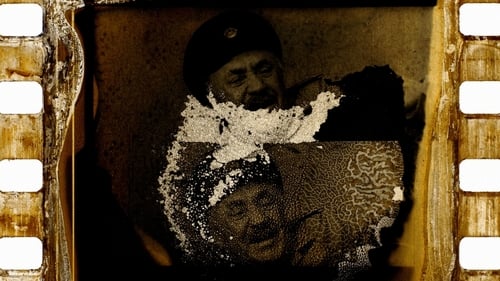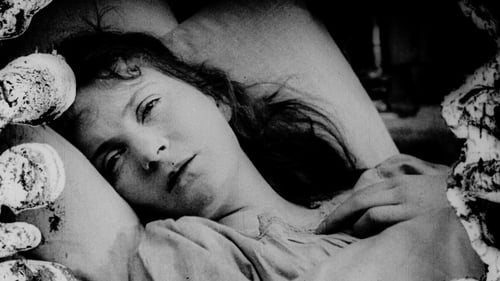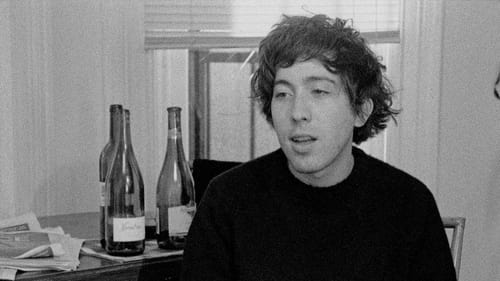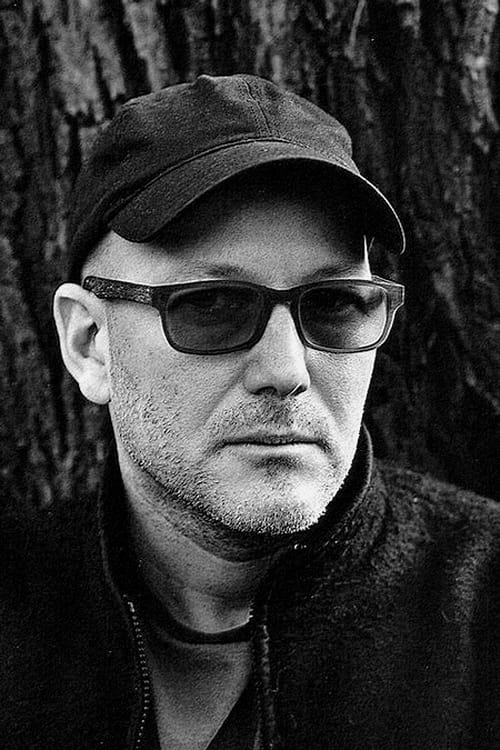
Director
A woman attends a party where she is observed by and finally meets a mysterious guest.

Director
Frequent Kronos collaborator Bill Morrison uses rare, early-20th century news footage to uncover ways that narratives about race have been used in the U.S. to divide people and maintain power.

Additional Photography
Atlantic Ocean, off the coast of Iceland, July 9, 2016. The surprising discovery of a canister —containing four reels of The Village Detective (Деревенский детектив), a 1969 Soviet film—, caught in the nets of an Icelandic trawler, is the first step in a fascinating journey through the artistic life of film and stage actor Mikhail Ivanovich Zharov (1899-1981), icon and star of an entire era of Russian cinema.

Sound Designer
Atlantic Ocean, off the coast of Iceland, July 9, 2016. The surprising discovery of a canister —containing four reels of The Village Detective (Деревенский детектив), a 1969 Soviet film—, caught in the nets of an Icelandic trawler, is the first step in a fascinating journey through the artistic life of film and stage actor Mikhail Ivanovich Zharov (1899-1981), icon and star of an entire era of Russian cinema.

Editor
Atlantic Ocean, off the coast of Iceland, July 9, 2016. The surprising discovery of a canister —containing four reels of The Village Detective (Деревенский детектив), a 1969 Soviet film—, caught in the nets of an Icelandic trawler, is the first step in a fascinating journey through the artistic life of film and stage actor Mikhail Ivanovich Zharov (1899-1981), icon and star of an entire era of Russian cinema.

Writer
Atlantic Ocean, off the coast of Iceland, July 9, 2016. The surprising discovery of a canister —containing four reels of The Village Detective (Деревенский детектив), a 1969 Soviet film—, caught in the nets of an Icelandic trawler, is the first step in a fascinating journey through the artistic life of film and stage actor Mikhail Ivanovich Zharov (1899-1981), icon and star of an entire era of Russian cinema.

Producer
Atlantic Ocean, off the coast of Iceland, July 9, 2016. The surprising discovery of a canister —containing four reels of The Village Detective (Деревенский детектив), a 1969 Soviet film—, caught in the nets of an Icelandic trawler, is the first step in a fascinating journey through the artistic life of film and stage actor Mikhail Ivanovich Zharov (1899-1981), icon and star of an entire era of Russian cinema.

Director
Atlantic Ocean, off the coast of Iceland, July 9, 2016. The surprising discovery of a canister —containing four reels of The Village Detective (Деревенский детектив), a 1969 Soviet film—, caught in the nets of an Icelandic trawler, is the first step in a fascinating journey through the artistic life of film and stage actor Mikhail Ivanovich Zharov (1899-1981), icon and star of an entire era of Russian cinema.

Producer
Bill Morrison’s experimental short features decayed film reels from the lost, German silent film Pawns of Passion (1928).

Director
Bill Morrison’s experimental short features decayed film reels from the lost, German silent film Pawns of Passion (1928).

Director
A short film made during lockdown.

Director
A short film made during lockdown.

Director
My cat Curly recorded this video on 4/7/20. It's a get well soon card to the world. (And remember to wash your paws!)

Director
A collection of films that have been found, or remain, on the Ocean's floor.

Director
a serene and endearing cat-cam video, made during lockdown and scored by Bill Frisell.

Himself
A TCM original production on why silent movies matter, featuring new interviews with Honorary Academy Award winner Kevin Brownlow, filmmaker Bill Morrison, TCM Silent Sunday Nights host Jacqueline Stewart, and film collector/expert Shane Fleming. They discuss the beauty, cultural importance, and long-standing impact that silent film holds in its celluloid.

Director
The film depicts the Lumière Brothers discussing and examining their Cinématographe machine. This film archive has traveled through time since 1925, traveling between different conservation sites before finally being stored in the Moving Image Research Collections of the University of South Carolina. Every degradation of the image is the result of a natural decomposition, the filmmaker makes no gesture of alteration of the image.

Director
Buried and Breaking Away demonstrates the effect of Bloomington, Indiana’s elements on one of its favorite cinematic progenies.

Director
Using the discarded, deteriorating remnants from seven silent film titles, filmmaker Bill Morrison braids a story of intertwining love triangles that pivots between the accounts of two women.

Director
An examination of weaving and the loom as the predecessor to modern-day computing. Using punched cards, weaving programs were designed for looms in 18th century, and by the dawn of the 19th century, the process was automated. This was the percursor of modern computing hardware.

Director
The film The Unchanging Sea (2018) was inspired by the discovery of a decaying print of DW Griffith's The Unchanging Sea (1910) in the nitrate vaults of the Library of Congress. Taking this ancient title as its point of departure, a new narrative was re-assembled from a variety of similarly ancient films about going off to, and returning from, the Sea. The characters in these old films appear to be emerging from the roiling oceans of Time, having floated like messages in bottles for over one hundred years, and now having washed up on our shores to tell us their stories.

This documentary focuses on the artistry of director Bill Morrison, who leverages decaying film stock from years past to tell new stories that are relevant to today's audiences. The decaying film lends brilliant visuals which add to Morrison's concept of storytelling.

Director
Following on from Bill Morrison's feature Dawson City: Frozen Time, a short film, Dawson City: Postscript (10 min, 2017) details the journey this collection took after it left Dawson City.

Himself
The true history of a collection of some 500 films dating from 1910s to 1920s, which were lost for over 50 years until being discovered buried in a sub-arctic swimming pool deep in the Yukon Territory, in Dawson City, located about 350 miles south of the Arctic Circle.

Producer
The true history of a collection of some 500 films dating from 1910s to 1920s, which were lost for over 50 years until being discovered buried in a sub-arctic swimming pool deep in the Yukon Territory, in Dawson City, located about 350 miles south of the Arctic Circle.

Editor
The true history of a collection of some 500 films dating from 1910s to 1920s, which were lost for over 50 years until being discovered buried in a sub-arctic swimming pool deep in the Yukon Territory, in Dawson City, located about 350 miles south of the Arctic Circle.

Writer
The true history of a collection of some 500 films dating from 1910s to 1920s, which were lost for over 50 years until being discovered buried in a sub-arctic swimming pool deep in the Yukon Territory, in Dawson City, located about 350 miles south of the Arctic Circle.

Director
The true history of a collection of some 500 films dating from 1910s to 1920s, which were lost for over 50 years until being discovered buried in a sub-arctic swimming pool deep in the Yukon Territory, in Dawson City, located about 350 miles south of the Arctic Circle.

Director
Little Orphant Annie is a re-edit of a silent film of the same title from 1918, directed by Colin Campbell. Two reels from an original nitrate print were scanned and re-edited to make the new film, which follows the structure of the poem written by James Whitcomb Riley in 1885. Riley is heard reciting his poem in a recording made in 1912. The poem is also heard read by Kelli Shay Hix in 2016, who additionally wrote and performs the song, “The Swimmer.”

Editor
Drawing from Portugal’s rich heritage of shipping, trade, and exploration, “The Dockworker's Dream” takes the viewer on a journey downriver, into port, into factories, towns, and families, and out into the great unknown. Different ports of call are framed by the solitary sojourn of a dockworker, perhaps remembering his own past, or dreaming of another's. Like the hunters in his dream, the film seeks to recover ancient and seldom viewed images from the recesses of our collective memory.

Director
Drawing from Portugal’s rich heritage of shipping, trade, and exploration, “The Dockworker's Dream” takes the viewer on a journey downriver, into port, into factories, towns, and families, and out into the great unknown. Different ports of call are framed by the solitary sojourn of a dockworker, perhaps remembering his own past, or dreaming of another's. Like the hunters in his dream, the film seeks to recover ancient and seldom viewed images from the recesses of our collective memory.

Walter's Brother
Shapeshifting between stardom and anonymity, an unhinged musician navigates a hyperreal combination of live action and animation daydreams in a struggle to release his first album.

Director
A response in music and film to the conflict that launched a century of war, and a celebration of the power of art to keep us sane and offer us comfort. Beyond Zero: 1914-1918 brings together three of the world's most pioneering artists: the Kronos Quartet, known for decades for their trailblazing performances and collaborations; acclaimed Serbian composer Aleksandra Vrebalov; and filmmaker Bill Morrison, respected for his work with rare and even partially destroyed archive images.

Director
A collection of films from an eclectic array of contributors commissioned to raise funds for the Bristol independent cinema The Cube.

Editor
In 1924, Jewish tradesmen in the newly-formed Soviet Union relocated to the Ukraine, Belarus and Crimea to form farming colonies. The film is of a tour to survey the so-called “Agro-Joint colonies” by the American Jewish Joint Distribution Committee, shot during one week in May 1927 by Bill Morrison’s grandfather, James H. Becker.

Director
In 1924, Jewish tradesmen in the newly-formed Soviet Union relocated to the Ukraine, Belarus and Crimea to form farming colonies. The film is of a tour to survey the so-called “Agro-Joint colonies” by the American Jewish Joint Distribution Committee, shot during one week in May 1927 by Bill Morrison’s grandfather, James H. Becker.

Himself
Things fall apart, but they are also reassembled and given new life, in an enlightened form. Meet the New York based artist and filmmaker Bill Morrison in this interview about his haunting experimental collage films 'Decasia' and 'Light is Calling'.

Director
Black-and-white film projections by Bill Morrison, using archival footage of frigid Arctic scenes.

Director
An English translation of ‘Kol Nidre’, the incantation that begins the Yom Kippur service and which pre-emptively nullifies any future vows made unintentionally. The film uses ancient archival films to depict an unknowable future, reflected through a dissolving historic document.

Director
Original Super 8 footage shot by Dr. Oliver Sacks of his patients at Beth Abraham Hospital, Bronx, NY, who were administered the drug L-Dopa in the summer of 1969 and “awakened” after decades of inactivity is featured in this cine-poem that combines archival footage with a score for solo saxophone composed by Philip Glass.

Director
The Mississippi River Flood of 1927 was the most destructive river flood in American history. In the spring of 1927, the river broke out of its banks in 145 places and inundated 27,000 square miles to a depth of up to 30 feet. Part of it enduring legacy was the mass exodus of displaced sharecroppers. Musically, the Great Migration of rural southern blacks to Northern cities saw the Delta Blues electrified and reinterpreted as the Chicago Blues, Rhythm and Blues, and Rock and Roll. Using minimal text and no spoken dialog, filmmaker Bill Morrison and composer - guitarist Bill Frisell have created a powerful portrait of a seminal moment in American history through a collection of silent images matched to a searing original soundtrack.

Director
'Just Ancient Loops' employs high resolution scans of ancient nitrate footage, as well as newly created CGI renderings of space to depict different views of heaven.

Director
This found-footage piece is based on an early study of the effects of cocaine by the filmmaker’s great-grandfather Carl Koller and Sigmund Freud, when the two were in medical school together in Vienna.

Director
An experimental film by Bill Morrison.

Director
'Tributes-Pulse' is a collaboration between American filmmaker Bill Morrison and Danish composer and percussionist Simon Christensen. Christensen originally conceived of the project as a tribute to four American composers, Charles Ives (1874-1954), Conlon Nancarrow (1912-1997), Steve Reich (b. 1936), and Trent Reznor (b. 1965). Using exquisitely deteriorating nitrate-based archival film, Morrison weaves a story from the remnants of disparate narratives. The episodes appear intermittently between the undulating pulse of the film's decay, the imagery compromised - yet made all the more poignant - by a dying celluloid medium, a rusted vessel carrying ghosts. Contrasting with the previous three sections, the final section is an original single-take contemporary aerial shot of the 'Graveyard of Ships' off of Staten Island, NY. Written by Anonymous

Director
Spark of Being, a close adaptation of Mary Shelley’s Gothic novel Frankenstein, explores the thematic interchangeability of three of the novel’s characters: the Captain, the Doctor, and the Creature. Spark of Being, which, as with all of Morrison's films, is dialogue-free, features Frank Hurley's original footage of Ernest Shackleton’s fated Antarctic expedition, along with a range of footage from other sources.

Director
The ill-fated coal mining communities in North East England are the subject of this inspired documentary by multi-media artist Bill Morrison. Their story is told entirely without words, yet the film is far from silent: it features a remarkable original score by the Icelandic composer Jóhann Jóhannsson.

Director
Video by Bill Morrison created for the Ridge Theater production of "Persephone", with music by Ben Neill and Mimi Goese. The staged production was part of the BAM Next Wave Festival 2010.

Director
On March 17, 1930, a crowd assembled outside Philadelphia's Eastern State Penitentiary in hopes of witnessing Al Capone's release from prison. Morrison and Vijay Iyer turn a single archival panning shot of that scene - origianally filmed in 1930 by Jack Painter - and its accompanying audio track - recorded in 1930 by Addison Tice -- into a split-screen surround sound panoramic film that continually doubles back on itself, creating a short cinematic meditation on the nature of spectacle and spectatorship.

Director

Director
A film symphony inspired by Los Angeles.

Walter
Walter Francis and Jerry Peoples, two characters from "Mutual Appreciation", share a visit at the Peoples' home in the countryside.

Director
Drawing from a passage from the Rosh Hashana Service, “Who shall live, who shall die… who by water, who by fire,” this short film deals with that which has been preordained—a future history that will in time unfold before us as the faces of passengers on a ship forces us to contemplate our own fate.

Director
Divided into three sections, Bill Morrison's The Highwater Trilogy examines our relationship to the threat of natural disaster by combining archival footage of icebergs, hurricanes, and floods with a soundtrack by David Lang and Michael Gordon.

Director
Film by Bill Morrison. Music by Julia Wolfe. Libretto by Deborah Artman.

Walter
Alan is a musician who leaves a busted-up band for New York, and a new musical voyage. He tries to stay focused and fends off all manner of distractions, including the attraction to his good friend's girlfriend.

Editor
In 1899, a photographer at American Mutoscope & Biograph mounted his camera on the front of a trolley traveling over the Brooklyn Bridge. The three 90-foot rolls he created were edited together to complete the journey from Manhattan to Brooklyn, entitled Across the Brooklyn Bridge. As a commission by the Museum of Modern Art for the re-opening of their facility, American avant-garde filmmaker Bill Morrison took this remarkable footage and recombined it with itself to form a new split-screen extrapolation.

Director
In 1899, a photographer at American Mutoscope & Biograph mounted his camera on the front of a trolley traveling over the Brooklyn Bridge. The three 90-foot rolls he created were edited together to complete the journey from Manhattan to Brooklyn, entitled Across the Brooklyn Bridge. As a commission by the Museum of Modern Art for the re-opening of their facility, American avant-garde filmmaker Bill Morrison took this remarkable footage and recombined it with itself to form a new split-screen extrapolation.

Director
A scene from The Bells (1926) is optically reprinted and edited to Michael Gordon's 7 minute composition. A meditation on the fleeting nature of life and love, as seen through the roiling emulsion of a film.

Director
A city symphony inspired by New York

Producer
Made by re-editing a deteriorated nitrate print of The Bells (1926), starring Lionel Barrymore and Boris Karloff, this work shows the fragility of the film image while foreshadowing the Holocaust.

Editor
Made by re-editing a deteriorated nitrate print of The Bells (1926), starring Lionel Barrymore and Boris Karloff, this work shows the fragility of the film image while foreshadowing the Holocaust.

Writer
Made by re-editing a deteriorated nitrate print of The Bells (1926), starring Lionel Barrymore and Boris Karloff, this work shows the fragility of the film image while foreshadowing the Holocaust.

Director
Made by re-editing a deteriorated nitrate print of The Bells (1926), starring Lionel Barrymore and Boris Karloff, this work shows the fragility of the film image while foreshadowing the Holocaust.

Director
A brief glimpse of Manhattan's skin. Music by Michael Gordon.

Editor
A meditation on the human quest to transcend physicality, constructed from decaying archival footage and set to an original symphonic score.

Writer
A meditation on the human quest to transcend physicality, constructed from decaying archival footage and set to an original symphonic score.

Director
A meditation on the human quest to transcend physicality, constructed from decaying archival footage and set to an original symphonic score.

Director
Explores Man's tendency to reduce the world into discrete intervals so that it might be more readily analyzed, even if not wholly understood.

Director
Singer-songwriter Slink Moss plays the mysterious driver of a Cadillac hearse who journeys across America to pick up and drop off a hitchhiker to his (final?) destination. The nearly-wordless film stylishly re-imagines the open road as a state of Limbo.

Director
An early Bill Morrison short, in this work he traverses an urban landscape utilizing high contrast black and white footage. The bustling nature of the setting is complimented by the energetic music by Michael Gordon.

The Curator
Based on the story of Howard Walls, A clerk at the Library of Congress who saved a collection of early paper reel films from the incinerator, director Bill Morrison embellishes the tale a bit in this inspired short work. Here, the vision of a woman in an early porno film has been engrained in the mind of a man working at the Library of Congress and his search for the film of her has an unexpected consequence, as he saves a collection of historically significant films from being destroyed.

Producer
Based on the story of Howard Walls, A clerk at the Library of Congress who saved a collection of early paper reel films from the incinerator, director Bill Morrison embellishes the tale a bit in this inspired short work. Here, the vision of a woman in an early porno film has been engrained in the mind of a man working at the Library of Congress and his search for the film of her has an unexpected consequence, as he saves a collection of historically significant films from being destroyed.

Editor
Based on the story of Howard Walls, A clerk at the Library of Congress who saved a collection of early paper reel films from the incinerator, director Bill Morrison embellishes the tale a bit in this inspired short work. Here, the vision of a woman in an early porno film has been engrained in the mind of a man working at the Library of Congress and his search for the film of her has an unexpected consequence, as he saves a collection of historically significant films from being destroyed.

Writer
Based on the story of Howard Walls, A clerk at the Library of Congress who saved a collection of early paper reel films from the incinerator, director Bill Morrison embellishes the tale a bit in this inspired short work. Here, the vision of a woman in an early porno film has been engrained in the mind of a man working at the Library of Congress and his search for the film of her has an unexpected consequence, as he saves a collection of historically significant films from being destroyed.

Director
Based on the story of Howard Walls, A clerk at the Library of Congress who saved a collection of early paper reel films from the incinerator, director Bill Morrison embellishes the tale a bit in this inspired short work. Here, the vision of a woman in an early porno film has been engrained in the mind of a man working at the Library of Congress and his search for the film of her has an unexpected consequence, as he saves a collection of historically significant films from being destroyed.

Director
Hauntingly beautiful preparation for the fashion show followed by the show itself.

Producer
The wind swirls up dust in a desert landscape. The picture is followed by images of clouds racing over the skyline of a city, of reflections on an expanse of water, of waves breaking over an embankment and of row upon row of burning candles. Then, gradually, music sets in: It initially accompanies the images, supports the patterns of movement in their characteristic style, pushes them ahead and enhances their drama. In Nemo, named after the captain in Jules Vernes «Twenty Thousand Leagues under the Sea», Morrison utilizes images of nature and natural phenomena to compose a cinematic poem about time and transience. (Claudia Slanar)

Director
The wind swirls up dust in a desert landscape. The picture is followed by images of clouds racing over the skyline of a city, of reflections on an expanse of water, of waves breaking over an embankment and of row upon row of burning candles. Then, gradually, music sets in: It initially accompanies the images, supports the patterns of movement in their characteristic style, pushes them ahead and enhances their drama. In Nemo, named after the captain in Jules Vernes «Twenty Thousand Leagues under the Sea», Morrison utilizes images of nature and natural phenomena to compose a cinematic poem about time and transience. (Claudia Slanar)

Writer
Originally planned as part of Michael Kanieckis play, «Howard Hughes: The World Is Round», the film follows the internal monologue of billionaire Hughes as he navigates between Earth and The Screening Room. James Godwin is featured in the voice-over. The performance was presented at The Kitchen, NYC, March 1994.

Director
Originally planned as part of Michael Kanieckis play, «Howard Hughes: The World Is Round», the film follows the internal monologue of billionaire Hughes as he navigates between Earth and The Screening Room. James Godwin is featured in the voice-over. The performance was presented at The Kitchen, NYC, March 1994.

Director
Originally produced for the opera "The Death Train of Baron Von Frankenstein". The opera was conceived and written by John Moran, directed for the stage by Bob McGrath, and produced by Ridge Theater. New York 1993.

Director
This is an excerpt from the 60-minute film commissioned for Conrad Cummings's opera of the same title, which was produced by Ridge Theater and staged at La Mama, NYC, in June, 1992.

Director
Early Bill Morrison film from 1992, black & white, 16mm.

Director
A film by Bill Morrison.

Writer
B/W visualization of the highway during the night.

Director
B/W visualization of the highway during the night.

Director
Directed by Bill Morrison

Director
An adventure from the point of view of a fly.





